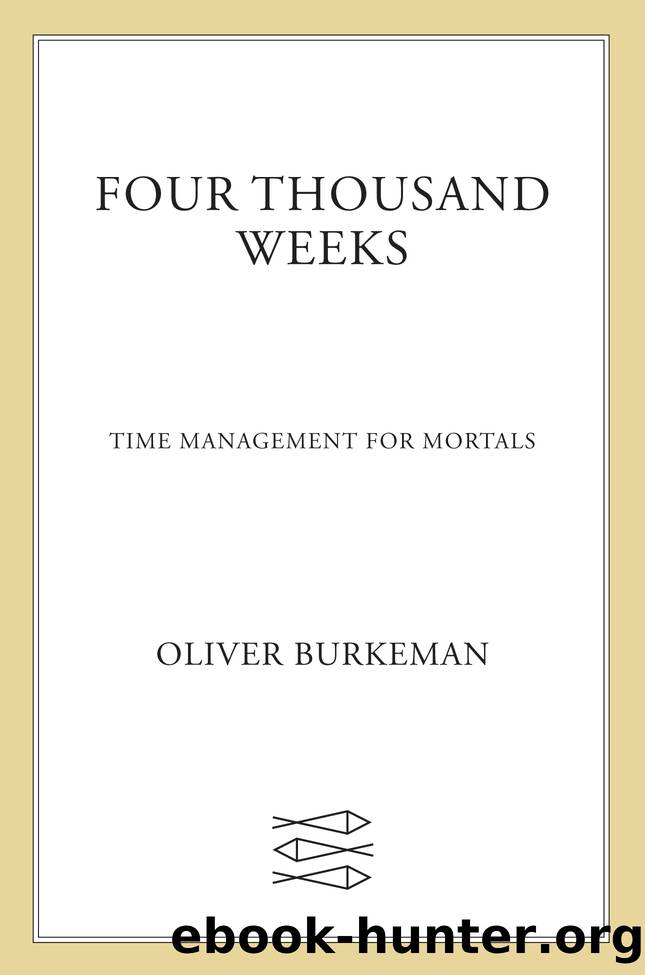Four Thousand Weeks: Time Management for Mortals by Oliver Burkeman

Author:Oliver Burkeman [Burkeman, Oliver]
Language: eng
Format: epub
Tags: Self-Help, Self-Management, Time Management, Personal Growth, Happiness, philosophy, General
ISBN: 9780374715243
Google: WFP2DwAAQBAJ
Publisher: Farrar, Straus and Giroux
Published: 2021-08-10T00:21:41.235522+00:00
Pathological Productivity
And yet here weâll need to confront a rarely acknowledged truth about rest, which is that weâre not merely the victims of an economic system that denies us any opportunity for it. Increasingly, weâre also the kind of people who donât actually want to restâwho find it seriously unpleasant to pause in our efforts to get things done, and who get antsy when we feel as though weâre not being sufficiently productive. An extreme example is the case of the novelist Danielle Steel, who in a 2019 interview with Glamour magazine revealed the secret of how sheâd managed to write 179 books by the time she turned seventy-two, releasing them at the rate of almost seven per year: by working almost literally all the time, in twenty-hour days, with a handful of twenty-four-hour writing periods per month, a single weekâs holiday each year, and practically no sleep. (âI donât get to bed until Iâm so tired I could sleep on the floor,â she was quoted as saying. âIf I have four hours, itâs a really good night for me.â) Steel drew widespread praise for her âbadassâ work habits. But itâs surely not unreasonable to perceive, in this sort of daily routine, the evidence of a serious problemâof a deep-rooted inability to refrain from using time productively. In fact, Steel herself seems to concede that she uses productivity as a way to avoid confronting difficult emotions. Her personal ordeals have included the loss of an adult son to a drug overdose and no fewer than five divorcesâand work, she told the magazine, is âwhere I take refuge. Even when bad things have happened in my personal life, itâs a constant. Itâs something solid I can escape into.â
If it seems uncharitable to accuse Steel of being pathologically unable to relax, I ought to clarify that the malady is widespread. Iâve suffered from it as acutely as anyone; and unlike Steel, I canât claim to have brought joy to millions of readers of romantic fiction as a happy side effect. Social psychologists call this inability to rest âidleness aversion,â which makes it sound like just another minor behavioral foible; but in his famous theory of the âProtestant work ethic,â the German sociologist Max Weber argued that it was one of the core ingredients of the modern soul. It first emerged, according to Weberâs account, among Calvinist Christians in northern Europe, who believed in the doctrine of predestinationâthat every human, since before they were born, had been preselected to be a member of the elect, and therefore entitled to spend eternity in heaven with God after death, or else as one of the damned, and thus guaranteed to spend it in hell. Early capitalism got much of its energy, Weber argued, from Calvinist merchants and tradesmen who felt that relentless hard work was one of the best ways to proveâto others, but also to themselvesâthat they belonged to the former category rather than the latter. Their commitment to frugal living supplied the other
Download
This site does not store any files on its server. We only index and link to content provided by other sites. Please contact the content providers to delete copyright contents if any and email us, we'll remove relevant links or contents immediately.
Zero to IPO: Over $1 Trillion of Actionable Advice from the World's Most Successful Entrepreneurs by Frederic Kerrest(4481)
Machine Learning at Scale with H2O by Gregory Keys | David Whiting(4283)
Never by Ken Follett(3922)
Harry Potter and the Goblet Of Fire by J.K. Rowling(3835)
Ogilvy on Advertising by David Ogilvy(3584)
Shadow of Night by Deborah Harkness(3344)
The Man Who Died Twice by Richard Osman(3055)
Book of Life by Deborah Harkness(2914)
The Tipping Point by Malcolm Gladwell(2897)
Will by Will Smith(2891)
0041152001443424520 .pdf by Unknown(2838)
My Brilliant Friend by Elena Ferrante(2812)
Purple Hibiscus by Chimamanda Ngozi Adichie(2800)
How Proust Can Change Your Life by Alain De Botton(2792)
How to Pay Zero Taxes, 2018 by Jeff A. Schnepper(2636)
Hooked: A Dark, Contemporary Romance (Never After Series) by Emily McIntire(2538)
Rationality by Steven Pinker(2344)
Can't Hurt Me: Master Your Mind and Defy the Odds - Clean Edition by David Goggins(2312)
Borders by unknow(2298)
